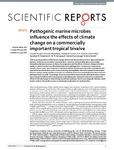Pathogenic marine microbes influence the effects of climate change on a commercially important tropical bivalve
| dc.contributor.author | Turner, Lucy | |
| dc.contributor.author | Alsterberg, C | |
| dc.contributor.author | Turner, AD | |
| dc.contributor.author | SK, G | |
| dc.contributor.author | Rai, A | |
| dc.contributor.author | Havenhand, JN | |
| dc.contributor.author | Venugopal, MN | |
| dc.contributor.author | Karunasagar, I | |
| dc.contributor.author | Godhe, A | |
| dc.date.accessioned | 2016-10-28T07:06:06Z | |
| dc.date.available | 2016-10-28T07:06:06Z | |
| dc.date.issued | 2016-08-31 | |
| dc.identifier.issn | 2045-2322 | |
| dc.identifier.issn | 2045-2322 | |
| dc.identifier.other | 32413 | |
| dc.identifier.uri | http://hdl.handle.net/10026.1/6659 | |
| dc.description.abstract |
<jats:title>Abstract</jats:title><jats:p>There is growing evidence that climate change will increase the prevalence of toxic algae and harmful bacteria, which can accumulate in marine bivalves. However, we know little about any possible interactions between exposure to these microorganisms and the effects of climate change on bivalve health, or about how this may affect the bivalve toxin-pathogen load. In mesocosm experiments, mussels, <jats:italic>Perna viridis,</jats:italic> were subjected to simulated climate change (warming and/or hyposalinity) and exposed to harmful bacteria and/or toxin-producing dinoflagellates. We found significant interactions between climate change and these microbes on metabolic and/or immunobiological function and toxin-pathogen load in mussels. Surprisingly, however, these effects were virtually eliminated when mussels were exposed to both harmful microorganisms simultaneously. This study is the first to examine the effects of climate change on determining mussel toxin-pathogen load in an ecologically relevant, multi-trophic context. The results may have considerable implications for seafood safety.</jats:p> | |
| dc.format.extent | 32413- | |
| dc.format.medium | Electronic | |
| dc.language | en | |
| dc.language.iso | en | |
| dc.publisher | Springer Science and Business Media LLC | |
| dc.subject | Animals | |
| dc.subject | Aquatic Organisms | |
| dc.subject | Bacteria | |
| dc.subject | Bivalvia | |
| dc.subject | Climate Change | |
| dc.subject | Ecosystem | |
| dc.subject | Marine Toxins | |
| dc.title | Pathogenic marine microbes influence the effects of climate change on a commercially important tropical bivalve | |
| dc.type | journal-article | |
| dc.type | Journal Article | |
| dc.type | Research Support, Non-U.S. Gov't | |
| plymouth.author-url | https://www.ncbi.nlm.nih.gov/pubmed/27576351 | |
| plymouth.issue | 1 | |
| plymouth.volume | 6 | |
| plymouth.publication-status | Published online | |
| plymouth.journal | Scientific Reports | |
| dc.identifier.doi | 10.1038/srep32413 | |
| plymouth.organisational-group | /Plymouth | |
| plymouth.organisational-group | /Plymouth/Faculty of Science and Engineering | |
| plymouth.organisational-group | /Plymouth/Faculty of Science and Engineering/School of Biological and Marine Sciences | |
| plymouth.organisational-group | /Plymouth/REF 2021 Researchers by UoA | |
| plymouth.organisational-group | /Plymouth/REF 2021 Researchers by UoA/UoA07 Earth Systems and Environmental Sciences | |
| plymouth.organisational-group | /Plymouth/Users by role | |
| plymouth.organisational-group | /Plymouth/Users by role/Academics | |
| dc.publisher.place | England | |
| dcterms.dateAccepted | 2016-08-09 | |
| dc.identifier.eissn | 2045-2322 | |
| dc.rights.embargoperiod | No embargo | |
| rioxxterms.versionofrecord | 10.1038/srep32413 | |
| rioxxterms.licenseref.uri | http://www.rioxx.net/licenses/all-rights-reserved | |
| rioxxterms.licenseref.startdate | 2016-08-31 | |
| rioxxterms.type | Journal Article/Review | |
| plymouth.oa-location | https://www.nature.com/articles/srep32413 |


